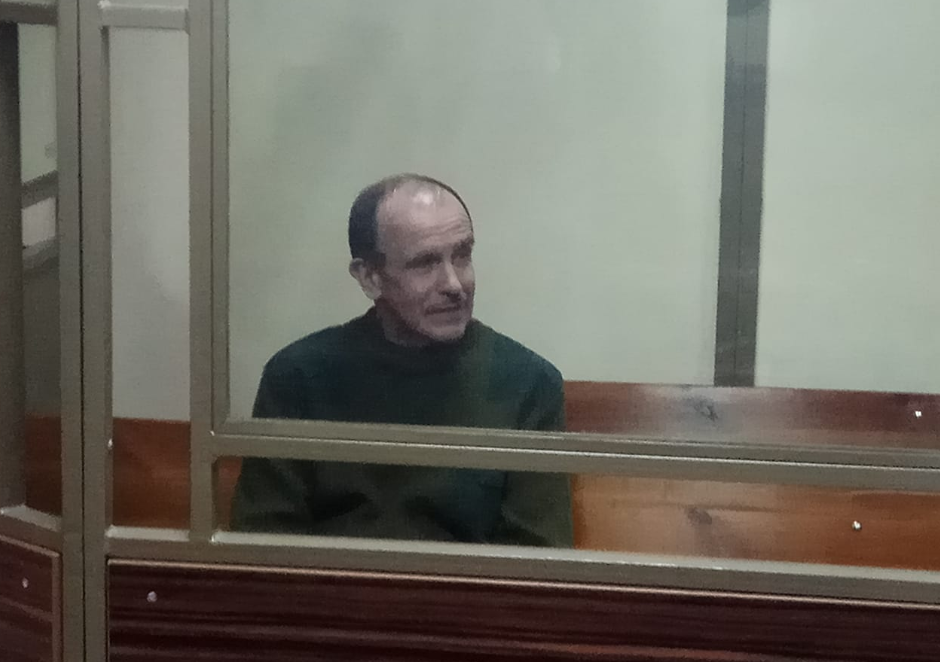• Topics / Human Rights Abuses in Russian-occupied Crimea
Russia sentences Crimean to 14 years for ‘revealing state secrets’ to Ukraine’ 15 years ago

Leonid Parkhomenko, a retired Black Sea Fleet captain from Sevastopol, has been convicted by the Russian military court in Rostov of ‘treason’ and sentenced to 14 years’ imprisonment. Parkhomenko denied the charges, which date back to 2003-2005, and there are strong grounds for suspecting the methods used to obtain the conviction.
Parkhomenko was arrested in Sevastopol on 22 November 2016, during a wave of arrests of Ukrainians on supposed ‘sabotage’ charges. Virtually nothing was known about him, with the only information coming from an FSB notification which appears to have been removed. Back in 2016, the FSB reported that Parkhomenko was accused of having gathered and passed on state secrets about the activities of the Black Sea Fleet to Ukrainian Military Intelligence. This was qualified as ‘state treason’, under Article 275 of the Russian criminal code. The charges and his role as a former Black Sea Fleet captain mean that he possibly only ever had Russian citizenship. The FSB likes to circulate videos of such arrests and of supposed ‘confessions’, so it was telling that on this occasion a video was shown, but without any sound.
Just over two years later, Parkhomenko has been sentenced under the same charge with supposed activities back in 2003-2005. While working as assistant to the head of the military unit groups in Sevastopol, he is alleged to have had access to “information constituting a state secret and to have passed this information to Ukraine’s Military Intelligence. It was claimed that he was recruited by the latter and that he revealed these ‘secrets’ for money.
Parkhomenko denied all the charges, however the ‘trial’ was held behind closed doors and there is effectively no way of knowing whether there was any evidence to back such charges dating back 15 years. There are no acquittals by Russian courts in such cases and a panel of three judges: Alexandr Generalov (presiding judge); Sergei Gorelov and Nikolai Gulko sentenced the 59-year-old to 14 years in a maximum security prison.
Parkhomenko had only a state-appointed lawyer Kaspar Kilyafan. Very often state-appointed lawyers are used by the investigators to put more pressure on the defendant to ‘confess’. Kilyafan has said that they will be appealing against the sentence, but has refused to provide any further comments.
The case was run by the FSB, with Parkhomenko held at the Lefortovo Prison. Judging by the photos that the FSB circulated in November 2016, and those taken in court, Parkhomenko has lost a huge amount of weight (reportedly, 40 kilograms) while imprisoned and it is known that he was on a protest hunger strike for at least 22 days from the middle of July this year.
Yevgeny Yenikeyev, a member of the Moscow civic committee allowed to visit prisoners, has reported that Parkhomenko told him that the hunger strike was “as the result of actions by the investigator, they began hounding my family”. The conversation was clearly being followed, and the deputy head of the security guards immediately stopped the meeting at this point and ordered that Parkhomenko be taken back to his cell.
Earlier during the meeting, Parkhomenko told Yenikeyev that he had been hurled to the ground during the arrest, but was stopped then also from continuing to describe ill-treatment.
The FSB has held several Ukrainian political prisoners in isolation and used all forms of methods to prevent them having lawyers of their own choice. This was the case, for example, with two men seized in 2014 and held at the same Lefortovo Prison. Yuri Soloshenko was 72 when arrested, so physical methods were not used, however he was put under huge psychological pressure and deceived into agreeing to a ‘lawyer’ whose task was only to get him to ‘confess’ and into admitting to ‘spying’ that he simply could not have done. Valentin Vyhivsky was considerably younger, and it is clear from the little he has been able to tell his mother, that he was brutally tortured.





